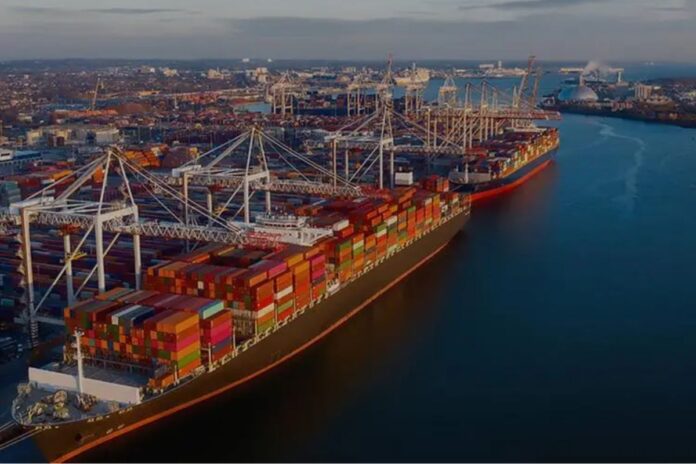The third Global Trade and Supply Chain Summit, organised by The Economist Impact, kicked off today at The Address Dubai Marina Hotel, Dubai.
Bringing together thought leaders, trade and supply chain policymakers, analysts, UN representatives and C-level officials in vital sectors, the event aims to address ways to boost the resilience of global trade operations, the essential link connecting sustainability and supply chains, and the role of emerging markets over the next years.
The Summit covers a host of various themes including the effects of geopolitical and economic turmoil on planning and supply-chain operations, digital trade and technology, the changing role of customs organisations and compliance teams, and measuring and deploying sustainability initiatives along the supply chain.
Participants discussed the role of trade transformation in fueling growth and new globalisation, the diversification of supply chains, sustainability, product tracing mechanisms, managing data in the field of digital trade, supply chain and trade resilience in emerging markets among other topics.
Realistic solutions
Day 1 of the Summit witnessed a number of panels that brought together decision-makers and senior executives from international businesses and organisations.
First among those was a panel headed by Dr. Thani bin Ahmed Al Zeyoudi, Minister of State for Foreign Trade, discussing the UAE’s role in trade transformation in its capacity as a major supply chain hub, and its commitment to offer realistic solutions for a smarter, more inclusive and sustainable global trade system.
In his keynote remarks, Dr. Thani Al Zeyoudi highlighted the UAE’s efforts to become a central location in the global value chain, pointing out that the UAE is working on a number of economic agreements to eliminate trade barriers and encourage growth.
He also discussed the UAE’s main trade partners now and in the future, how government policies in the UAE support trade growth, and Dubai’s endeavours to realise its ambition to become a major trade hub.
Dr. Al Zeyoudi said,
“Trade has been essential to the development of the UAE, powering our economic vision by opening new markets, stimulating industrial productivity, creating jobs and introducing new skills and capabilities. It is why we remain a committed advocate of the multilateral trading system. But it is essential trade evolves with the times, adapting to new technologies, developmental challenges and environmental responsibilities. As we build towards MC13, we will be restating the case for open, accessible and well-regulated supply chains – and using platforms such as the Global Trade and Supply Chain Summit to urge stakeholders and policymakers to come together to make them fit for the 21st century.”
Under the theme ‘Taking trade into a new era—payments as the catalyst for trade’s digital transformation’, Shahrokh Moinian, Managing Director, Head of EMEA at J.P. Morgan, stressed that the time has come for trade to move on from paper and cash, and stepping into a new era with digital payments. He answered questions relating to the role of fintech in driving digital transformation of trade around the world, as well as the role of e-commerce.
Addressing the theme ‘Big business and trade policy—how can companies do more’, Mohammad Ali bin Rashed Lootah, President and CEO, Dubai Chambers, talked about the need for the voice of the business community to be a part of the policymaking conversation on trade.
Beat Simon, Group Chief Commercial Officer, DP World, explored how diversifying supply chains and implementing logistical resilience can ensure that global trade is prepared for whatever comes next, during a panel entitled Addressing international trade challenges with end-to-end supply chain resilience.
Other panels held on the first day of the Global Trade and Supply Chain Summit included a panel entitled ‘New trade agreements—can they revive global trade?’, where Elizabeth Baltzan, Senior Advisor at Office of the United States Trade Representative and Beata Javorcik, Chief Economist at the European Bank for Reconstruction and Development, answered questions on which countries are negotiating new trade agreements and whether such agreements will create substantial trade growth.
By playing host to the Global Trade and Supply Chain Summit, Dubai is further establishing its growing role as a global economic and logistic hub, and a key destination for ambitious businesses looking to extend their reach in the region.
The Economist Impact’s decision to host the Global Trade and Supply Chain Summit in Dubai reflects the emirate’s central role as a hub for global supply chains, along with the role that emerging markets such as the Middle East, Africa and Southeast Asia will play in years to come.
Alongside the event’s host, the Executive Office of His Highness Sheikh Mohammed Bin Rashid Al Maktoum, the Global Trade and Supply Chain Summit is sponsored by DP World, JP Morgan, SAP and Citibank.
News Source: Emirates News Agency
